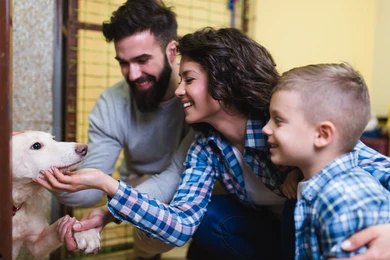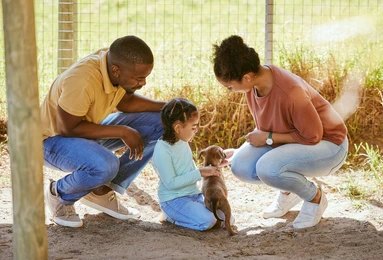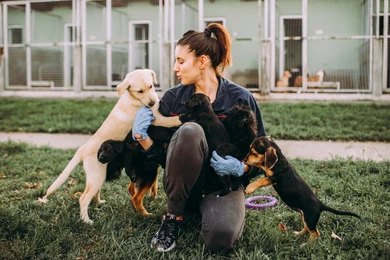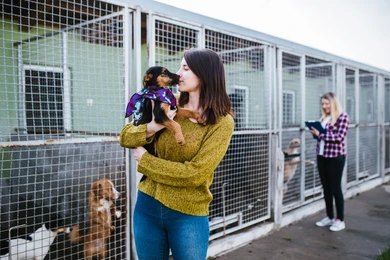After spending a lot of time researching your breed to make sure it fits your personality and lifestyle, how do you choose your puppy from the litter?
A fertility specialist should be able to help you make your choice. It’s a good idea to tell the breeder what your needs and expectations are for the dog.
For example, do you have a goal that you want to share? Do you want nothing more than a partner? Do you want your dog to be responsible for handling weapons or animals? Do you want to participate in dog sports like obedience, agility, working trials, and more?
Although all puppies need the same attention and care, your breeding experience can help you tell which of your puppies will be successful in your favor. Some breeders may also perform stress tests on their puppies to help them better match their owners.
Remember that you won’t be allowed to get rid of the entire litter. Many breeders have a waiting list for puppies, so some puppies may already have homes waiting for them. But it’s nice to see the kids together and see how they interact with each other.
You should have seen the pool. Watch his behavior when you meet him. If he shows any aggression, fear or violence, stay away from his children. A good breeder does not necessarily have a stallion of his own, but in many cases they will travel far to breed a bitch to the best dog for him. However, you should get the father’s name, address and test results. If the breeder has a stallion, you need to meet him and make sure he is well-behaved.

When You meet The Dog You should Look For The Following
There should be no discharge from the eyes or from the nose.
The ears should look, and smell, clean.
The breath should smell of nothing other than ‘dog’.
The bottom should be clean with no sign of diarrhoea or discharge from the genitalia.
It can take time for some breeds to grow into their ears, feet, and skin, so no need to worry if the dogs appear a little out of proportion in some areas.
Testicles can sometimes take a while to drop, so no need for immediate panic if you cannot feel them.
The puppies should have bright eyes.
The skin should be clean – no sores, dandruff, or parasites.
Check for hernias – the pup should have no odd lumps or bumps in the abdominal area.
Puppies can be very unco-ordinated, but there should be no sign of lameness.
The nose may not be cold and wet but it should not appear dried out or crusty.
Do not be alarmed if the pups have ‘knobbly knees’ this is quite normal.
The immediate surroundings of the puppies should look and smell clean.

Puppies can be bold, shy, or medium-sized. Their behavior and temperament can vary depending on the time of day. For example, they may have recently eaten something and are acting strangely. Don’t let your emotions control your head when examining your puppy. Don’t pick the smallest, shyest, saddest looking puppy just because you don’t think it’s good for him.
Remember that the bravest, most outgoing and active puppies will probably be in the minority. Not only are these stores detrimental to the physical and mental health of the puppy, they are also often where puppy products are sold. Go to a good breeder who raises the best animals, and their dogs will receive the best care and love.
Here Are Some Questions You Might Want To Ask A Breeder
Since a puppy can be purchased, it is important to purchase from a reputable breeder. The following questions are provided as a guide to determine if you can trust that your favorite dog was raised by someone whose primary goal is good morals and integrity.
Many of these questions are usually answered during a normal conversation, as they are interested in their female dog, choosing a male, and the puppy or puppies are living in the ground. They also do not have a hard time answering specific questions because your questions show that you have thought carefully about your purchase.
1) Are both male and female dogs registered with the Kennel Club? If your favourite breed is recognised by the Kennel Club, both parents must be registered.
2) Are all puppies registered with the Kennel Club? Similarly, if it is a recognised puppy and both the male and female are registered, the breeder must register the puppy.
3) How old is the bitch? Although the age of the bitch varies depending on the breed, the general rule is that the bitch should not be mated before her third heat and after she is 7 years old.
4) How many cubs are born? A good breeder rarely has more than three cubs from a female.
5) What is the desire of the parents? It is not a good idea to raise a dog that is aggressive, fearful or has other negative issues.
6) Why did you decide to breed this female? The first thing a reputable breeder thinks about when breeding is the development of the breed. They hope that the litter will produce better offspring than their parents.
7) What medical tests have the parents had? Many dogs suffer from certain diseases that can be diagnosed before birth. You should get the test results.
8) Do you have a husband? Many breeders will not have a male dog, preferring to bring their female dog to the one that is best for her. If she is a breeder, you should meet her and evaluate her behavior, as well as review her pedigree and registration information. If the sire is not from a breeder, you will need to see a picture, pedigree, a copy of the registration certificate, and provide the owner’s name and address.
9) Does the father know him? Breeders usually choose a proven man, that is, someone who knows the dog and can pass on good manners to his puppies.
10) Do I need to sign a contract when buying a puppy? Some breeders ask buyers to sign a contract that covers things like the puppy’s health, decontamination, and the dog’s future behavior. It is important to state the specific terms of the contract and the obligations of both parties.
11) Where are the puppies? Raising a puppy in a home environment can be very beneficial. They will socialize early and make noise in the house.
12) Has the puppy been vaccinated? When you bring your puppy home, it should be dewormed and you should get a document showing that it has been vaccinated.
13) Will puppies be included in the register or restricted? Most breeders place their puppies on a restricted list, meaning they cannot be found and must not be bred. If a dog is used for breeding purposes during the restricted registration period, the resulting puppies cannot be registered with the Kennel Club. Only the breeder can withdraw consent.
14) If I can’t keep the dog for any reason, will you take him back? A good breeder will bring back a dog that they are responsible for, regardless of the dog’s age or potential problems.
15) Can I contact you if I have any concerns or questions in the future? A good breeder will be happy to guide you through your dog’s life. Even if there are no problems, many breeders want their puppies to be close together.
16) When do you put your puppy in their new home? This will vary by breed. Generally, puppies are placed around 8 weeks of age. Some types of toys take longer to get, but puppies should not be put down before 7 weeks of age.
17) Do you have a waiting list for potential homes? This is a good guide if someone is waiting for a puppy from a breeder and/or a certain breed.

Here Are Some Questions A Breeder Might Ask You
A conscientious breeder wants to place his/her puppies in the very best homes possible. When enquiring to purchase a pup these are some of the questions that a good breeder may ask you.
1) Have you had dogs before? If so, what happened to them?
2) Have you given birth before? If not, how did you decide this type was right for you?
Please do not buy a puppy from a pet store. These stores are not only harmful to the puppy’s physical and mental health, but are also often places where puppy products are sold
3) Have you ever spent time with an adult of this species? Do you know the exercise needs, feeding costs, maintenance costs, veterinary costs, etc. of these animals?
4) Do you have dogs now? If so, of what breed, sex, age?
5) Do you want a dog or a dog? Why do you need a gender?
6) What do you think about this dog? Teaching/petting/raising/working etc.?
7) Do you plan on bringing your dog to class?
8) How long should a dog be left alone?
9) What do you do with your dog when you go out?
10) Where will the dog live – inside or outside?
11) Where will the dog sleep?
12) Are you planning to spay/neuter your dog?
13) Where do you live – city/suburb/rural etc.?
14) Do you rent or own your property? If renting do you have the landlord’s permission to keep a dog on the premises?
15) Are you in a stable relationship? If so, are you both equally committed to owning a dog?
16) Do you have children? If so, of what age?
17) What sort of fencing do you have?
18) How big is your outdoor gym?
19) Would you like me or my agent to inspect the home?
20) Do you have a regular veterinarian? If so, would you give consent for me to contact him/her?
21) If you can’t keep the dog for any reason, will you return it to me, no matter how old it is?





